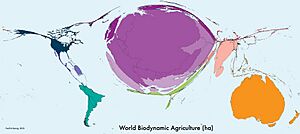Biodynamic agriculture facts for kids
Biodynamic agriculture is a special way of farming. It's a lot like organic farming, but it adds some unique ideas. These ideas come from Rudolf Steiner (1861–1925), who developed this method in 1924. It was actually the very first type of organic farming!
In biodynamic farming, everything on a farm is seen as connected. This means the soil, the plants, and the animals are all part of one big system. Farmers try to make sure they all work together in a healthy way.
Contents
What is Biodynamic Agriculture?
Biodynamic farming shares many goals with other organic methods. Farmers use natural materials like manure and compost to make the soil healthy. They do not use artificial fertilizers, pesticides, or weed killers. This helps keep the environment clean and safe.
How is it Different?
What makes biodynamic farming special?
- It treats the whole farm – animals, crops, and soil – as a single living system.
- It focuses on growing food and selling it locally.
- Farmers often use old types of plants and animals, and sometimes create new ones.
- Some biodynamic farmers even use a special calendar. This calendar helps them decide when to plant or sow seeds based on the moon and stars.
Where is it Used?
Biodynamic farming is used all over the world. In 2020, this method was used on over 250,000 hectares of land. That's like 250,000 football fields! It was practiced in 55 different countries.
The countries with the most biodynamic farms are Germany, Australia, and France. Germany alone has almost half of all the biodynamic farmland in the world. Many famous vineyards also use biodynamic methods to grow grapes for wine.
Images for kids
-
Rudolf Steiner, who started the ideas behind biodynamic farming.
See also
 In Spanish: Agricultura biodinámica para niños
In Spanish: Agricultura biodinámica para niños



